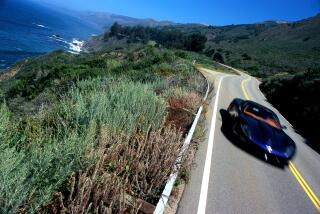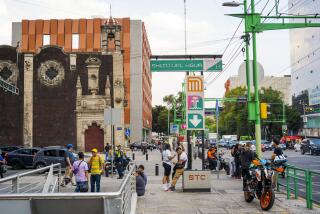PLEASURES OF THE ROAD : DRIVERS’ CHECKLIST
- Share via
Steve Kassanyi has probably logged more miles in Baja California than any American. Kassanyi, 47, is race director for SCORE, which annually stages the world-famous Baja 1000 off-road race. By his estimation, he’s run up more than 100,000 miles in the past 14 years marking and testing the course and, after the race, removing markers. Next month, he’ll spend three weeks doing it all again for the 1988 version of the event. Thus, Kassanyi is eminently qualified to offer tips about driving in Baja California. Here are his suggestions:
* Never drive in Mexico without proper auto insurance. A three-day package for AAA members, for example, can cost from $8 to $12 a day, depending upon the value of the insured vehicle. Representatives of Mexican insurance companies, located near the border, issue short-term policies at reasonable rates. It’s advisable to carry a passport or a tourist card; the latter is valid for six months and can be obtained without cost at the Mexican consulate, immigration office at Mexican border points or at the Mexican Government Ministry of Tourism office in Los Angeles.
* Carry both pesos and dollars. In back-country areas, dollars are sometimes not accepted. Many banks in Southern California sell pesos.
* Pack your own drinking water. For longer trips (150 miles or more per day), 5 gallons is best.
* Before starting out on any lengthy trip, check your car’s hoses, belts and tires and replace them if they show signs of wear. It’s a good idea to take along an extra fan belt.
* When driving long stretches at a time, top off your gas tank at every service station. Stations can be miles apart, and you can’t always count on the next station having the type of fuel--or the quantity--you need.
* If you have mechanical trouble, remain with your car. Wait for the Green Angels, a helpful truck driver or another passer-by.
* Never surrender your car-insurance or registration papers to anyone except an officer of the law.
* Drive carefully. Accidents in the Baja--however minor--are treated as felonies, not misdemeanors.
* In towns and villages, pay attention to stop lights and stop signs. They aren’t always clearly visible.
* Whenever possible, drive in rural areas during the daytime. Cows and horses are not always fenced in and sometimes stray onto highways.
* Carry a Spanish-English/ English-Spanish phrase book.
More to Read
Sign up for The Wild
We’ll help you find the best places to hike, bike and run, as well as the perfect silent spots for meditation and yoga.
You may occasionally receive promotional content from the Los Angeles Times.






